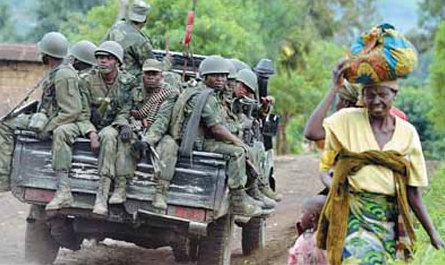Rebels in DR Congo end their insurgency
Democratic Republic of Congo rebels said on Tuesday they were laying down their arms after a crushing assault by the UN-backed army pushed them out of the country's mineral-rich, troubled east.
The M23 movement said in a statement that it had "decided from this day to end its rebellion" and instead to pursue its goals "through purely political means".
The move ends the insurgency that for 18 months has ravaged the region rich in natural resources and the scene of some of Africa's deadliest conflicts over the past two centuries.
Earlier, Kinshasa claimed "total victory" over the M23 after capturing the last two hills held by the movement's die-hard fighters.
"The last remnants of the M23 have just abandoned their positions," said Lambert Mende, communications minister and government spokesman.
"It's a total victory for the DRC," he said, adding that the holdout insurgents fled to neighboring Rwanda.
"We have finished the job," said Lieutenant Colonel Olivier Amuli, an army spokesman in the North Kivu region, where the fighting occurred.
The Congolese army launched a major offensive against the rebels on Oct 25, steadily claiming their strongholds until dozens of fighters were pushed this weekend onto three hilltops about 80 kilometers north of the regional capital Goma and near the border of Rwanda.
The beleaguered insurgents called for a truce, but the army pressed on with its assault, claiming one of the hilltops on Monday.
The United Nations special force in the region, which had been backing the Congolese forces with aerial reconnaissance, intelligence and planning, joined direct combat late on Monday after getting the green light to bombard the remaining positions of the beleaguered rebels.
"We will continue to fire until everything is under control," said a source at the UN brigade.
Analysts say better preparation by the Congolese troops and the backing of the UN brigade with the unprecedented offensive mandate have helped changed the war in the restive east of the DR Congo.
The heavily armed, 3,000-strong UN intervention brigade joined 17,000 peacekeepers already deployed to carry out offensive operations against the rebel fighters, who are accused of human rights abuses including rape, murder and recruiting child soldiers.
The UN refugee agency said on Monday it had moved another 3,000 Congolese refugees to its transit camp in Uganda's town of Kisoro to escape the fighting, bringing the total number of refugees in the small town to 8,000.
The area of North and South Kivu in DR Congo has for decades been the center of conflict because of its location - having borders with Rwanda, Uganda, Burundi and Tanzania - and the minerals that lie buried underneath its lush green hills.
The minerals include gold, coltan and tin, key components in electronic devices from cell phones to televisions and computers.
|
Soldiers of the Democratic Republic of Congo sit on the back of a pick-up truck as they head toward the Mbuzi hilltop, near Rutshuru, on Monday, after the army recaptured the area from M23 rebels. Junior D. Kannah / Agence France-Presse |
(China Daily 11/06/2013 page12)









